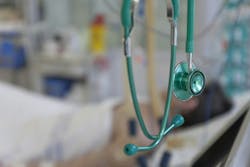Independent studies presented at ESCMID Global demonstrate the clinical utility of SeptiCyte RAPID in patients suspected of sepsis, including in polytrauma patients
Immunexpress, Pty Ltd. announced the presentation of two posters evaluating SeptiCyte RAPID at the European Society of Clinical Microbiology and Infectious Diseases (ESCMID Global) 2024, to take place from April 27 – 30 in Barcelona, Spain.
A Nantes University poster #P3895 entitled, "SeptiCyte RAPID, a new biomarker for the diagnosis of ventilator-associated pneumonia in polytrauma patients," will be presented on April 27, at noon CET.
Samples were collected from 75 adult trauma patients in the intensive care unit (ICU) having systemic inflammatory response syndrome (SIRS) or suspected nosocomial infection. Samples were evaluated using SeptiCyte RAPID and compared to a standard clinical evaluation by a blinded physician in the ICU. The SeptiScore was significantly higher in patients with ventilator-associated pneumonia (VAP) or another form of nosocomial infection. The median SeptiScore in patients with VAP was 8.20 (7.20; 8.80), while the median SeptiScore in patients without VAP or nosocomial infection was 5.70 (5.03; 6.70), p<0.001. SeptiCyte RAPID performance for the diagnosis of VAP or nosocomial infection had area under the ROC curve (AUC) value 0.83 (95% Cl 0.72-0.90). SeptiCyte RAPID differentiated between trauma patients with VAP or another form of nosocomial infection and those with non-septic SIRS.
A University of Saarland poster #P0959 entitled, "Prospective evaluation of the SeptiCyte® RAPID assay for the identification of systemic infectious diseases in patients with suspected sepsis," will be presented on April 28, at noon CET.
Samples were collected from 28 patients suspected of sepsis and receiving anti-infective treatment in the ICU. In patients with suspected sepsis, those with an identified causative agent had higher SeptiScores than those without. The data warrant further analysis to evaluate the diagnostic accuracy of SeptiCyte RAPID for differentiation of individuals with an infectious etiology from those with other causes.

